Caring for the Patient: A Journey of Trust, Help, and Caring
VerifiedAdded on 2019/10/16
|12
|3602
|228
Report
AI Summary
The assignment content emphasizes the importance of conscious caring in nursing practices. It highlights that being present and taking care of patients is crucial, extending beyond just patient care to also include caregivers. Caring is seen as an art that requires dedication and experience. The content also stresses the need for nurses to think critically, have excellent communication skills, and be able to manage conflicts effectively. Ultimately, the goal is to achieve optimal client care and health outcomes.
Contribute Materials
Your contribution can guide someone’s learning journey. Share your
documents today.
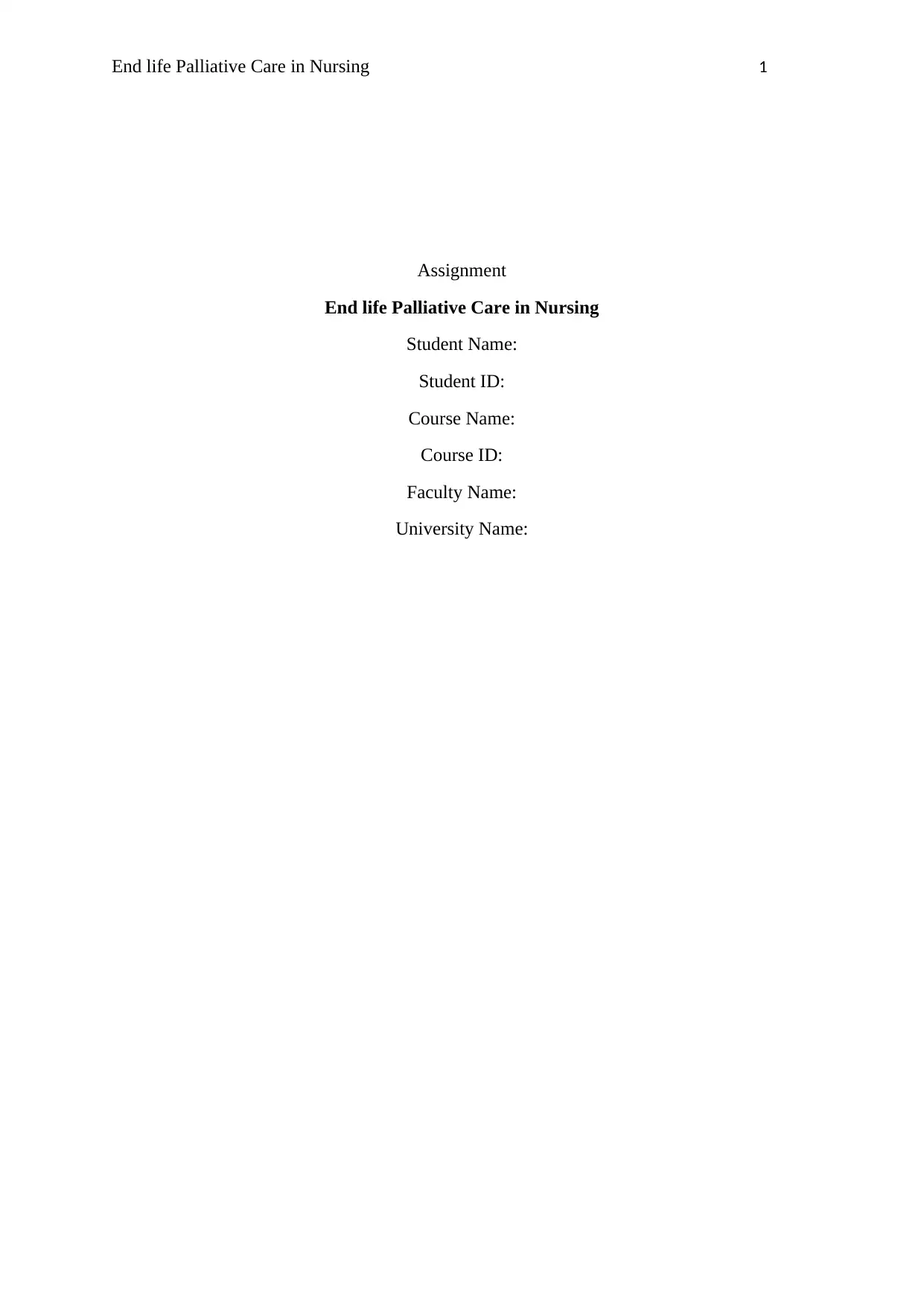
End life Palliative Care in Nursing 1
Assignment
End life Palliative Care in Nursing
Student Name:
Student ID:
Course Name:
Course ID:
Faculty Name:
University Name:
Assignment
End life Palliative Care in Nursing
Student Name:
Student ID:
Course Name:
Course ID:
Faculty Name:
University Name:
Secure Best Marks with AI Grader
Need help grading? Try our AI Grader for instant feedback on your assignments.
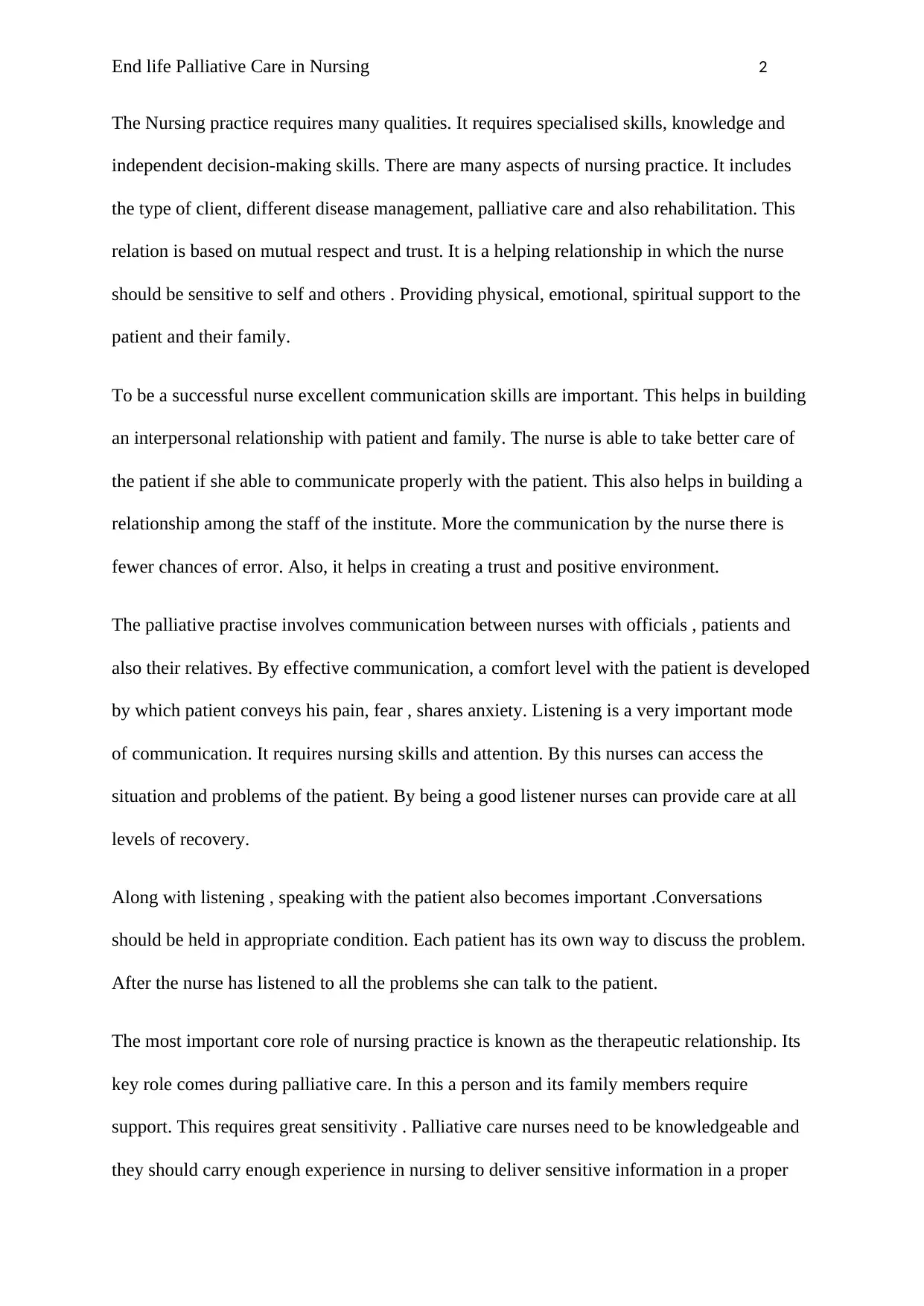
End life Palliative Care in Nursing 2
The Nursing practice requires many qualities. It requires specialised skills, knowledge and
independent decision-making skills. There are many aspects of nursing practice. It includes
the type of client, different disease management, palliative care and also rehabilitation. This
relation is based on mutual respect and trust. It is a helping relationship in which the nurse
should be sensitive to self and others . Providing physical, emotional, spiritual support to the
patient and their family.
To be a successful nurse excellent communication skills are important. This helps in building
an interpersonal relationship with patient and family. The nurse is able to take better care of
the patient if she able to communicate properly with the patient. This also helps in building a
relationship among the staff of the institute. More the communication by the nurse there is
fewer chances of error. Also, it helps in creating a trust and positive environment.
The palliative practise involves communication between nurses with officials , patients and
also their relatives. By effective communication, a comfort level with the patient is developed
by which patient conveys his pain, fear , shares anxiety. Listening is a very important mode
of communication. It requires nursing skills and attention. By this nurses can access the
situation and problems of the patient. By being a good listener nurses can provide care at all
levels of recovery.
Along with listening , speaking with the patient also becomes important .Conversations
should be held in appropriate condition. Each patient has its own way to discuss the problem.
After the nurse has listened to all the problems she can talk to the patient.
The most important core role of nursing practice is known as the therapeutic relationship. Its
key role comes during palliative care. In this a person and its family members require
support. This requires great sensitivity . Palliative care nurses need to be knowledgeable and
they should carry enough experience in nursing to deliver sensitive information in a proper
The Nursing practice requires many qualities. It requires specialised skills, knowledge and
independent decision-making skills. There are many aspects of nursing practice. It includes
the type of client, different disease management, palliative care and also rehabilitation. This
relation is based on mutual respect and trust. It is a helping relationship in which the nurse
should be sensitive to self and others . Providing physical, emotional, spiritual support to the
patient and their family.
To be a successful nurse excellent communication skills are important. This helps in building
an interpersonal relationship with patient and family. The nurse is able to take better care of
the patient if she able to communicate properly with the patient. This also helps in building a
relationship among the staff of the institute. More the communication by the nurse there is
fewer chances of error. Also, it helps in creating a trust and positive environment.
The palliative practise involves communication between nurses with officials , patients and
also their relatives. By effective communication, a comfort level with the patient is developed
by which patient conveys his pain, fear , shares anxiety. Listening is a very important mode
of communication. It requires nursing skills and attention. By this nurses can access the
situation and problems of the patient. By being a good listener nurses can provide care at all
levels of recovery.
Along with listening , speaking with the patient also becomes important .Conversations
should be held in appropriate condition. Each patient has its own way to discuss the problem.
After the nurse has listened to all the problems she can talk to the patient.
The most important core role of nursing practice is known as the therapeutic relationship. Its
key role comes during palliative care. In this a person and its family members require
support. This requires great sensitivity . Palliative care nurses need to be knowledgeable and
they should carry enough experience in nursing to deliver sensitive information in a proper
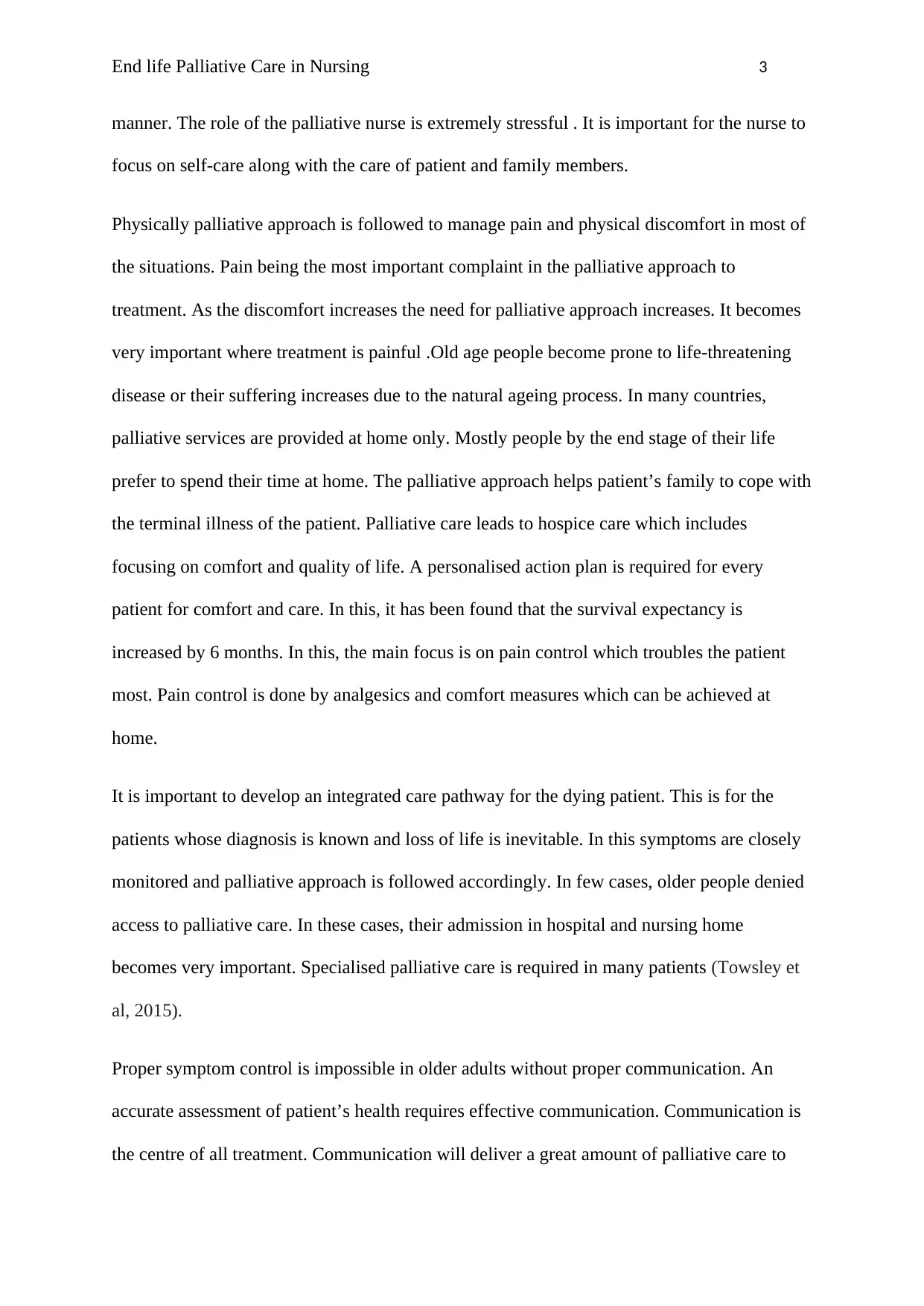
End life Palliative Care in Nursing 3
manner. The role of the palliative nurse is extremely stressful . It is important for the nurse to
focus on self-care along with the care of patient and family members.
Physically palliative approach is followed to manage pain and physical discomfort in most of
the situations. Pain being the most important complaint in the palliative approach to
treatment. As the discomfort increases the need for palliative approach increases. It becomes
very important where treatment is painful .Old age people become prone to life-threatening
disease or their suffering increases due to the natural ageing process. In many countries,
palliative services are provided at home only. Mostly people by the end stage of their life
prefer to spend their time at home. The palliative approach helps patient’s family to cope with
the terminal illness of the patient. Palliative care leads to hospice care which includes
focusing on comfort and quality of life. A personalised action plan is required for every
patient for comfort and care. In this, it has been found that the survival expectancy is
increased by 6 months. In this, the main focus is on pain control which troubles the patient
most. Pain control is done by analgesics and comfort measures which can be achieved at
home.
It is important to develop an integrated care pathway for the dying patient. This is for the
patients whose diagnosis is known and loss of life is inevitable. In this symptoms are closely
monitored and palliative approach is followed accordingly. In few cases, older people denied
access to palliative care. In these cases, their admission in hospital and nursing home
becomes very important. Specialised palliative care is required in many patients (Towsley et
al, 2015).
Proper symptom control is impossible in older adults without proper communication. An
accurate assessment of patient’s health requires effective communication. Communication is
the centre of all treatment. Communication will deliver a great amount of palliative care to
manner. The role of the palliative nurse is extremely stressful . It is important for the nurse to
focus on self-care along with the care of patient and family members.
Physically palliative approach is followed to manage pain and physical discomfort in most of
the situations. Pain being the most important complaint in the palliative approach to
treatment. As the discomfort increases the need for palliative approach increases. It becomes
very important where treatment is painful .Old age people become prone to life-threatening
disease or their suffering increases due to the natural ageing process. In many countries,
palliative services are provided at home only. Mostly people by the end stage of their life
prefer to spend their time at home. The palliative approach helps patient’s family to cope with
the terminal illness of the patient. Palliative care leads to hospice care which includes
focusing on comfort and quality of life. A personalised action plan is required for every
patient for comfort and care. In this, it has been found that the survival expectancy is
increased by 6 months. In this, the main focus is on pain control which troubles the patient
most. Pain control is done by analgesics and comfort measures which can be achieved at
home.
It is important to develop an integrated care pathway for the dying patient. This is for the
patients whose diagnosis is known and loss of life is inevitable. In this symptoms are closely
monitored and palliative approach is followed accordingly. In few cases, older people denied
access to palliative care. In these cases, their admission in hospital and nursing home
becomes very important. Specialised palliative care is required in many patients (Towsley et
al, 2015).
Proper symptom control is impossible in older adults without proper communication. An
accurate assessment of patient’s health requires effective communication. Communication is
the centre of all treatment. Communication will deliver a great amount of palliative care to
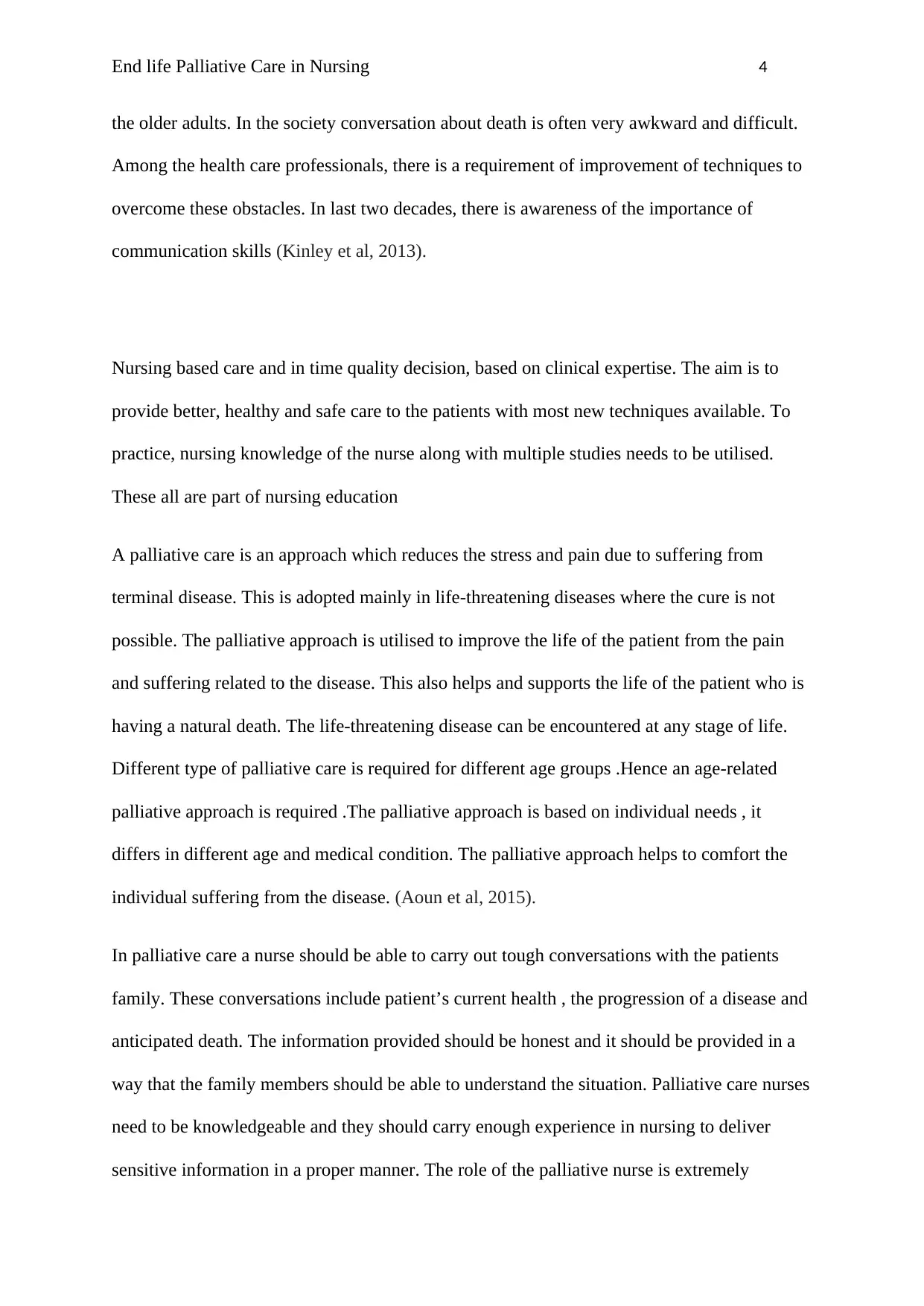
End life Palliative Care in Nursing 4
the older adults. In the society conversation about death is often very awkward and difficult.
Among the health care professionals, there is a requirement of improvement of techniques to
overcome these obstacles. In last two decades, there is awareness of the importance of
communication skills (Kinley et al, 2013).
Nursing based care and in time quality decision, based on clinical expertise. The aim is to
provide better, healthy and safe care to the patients with most new techniques available. To
practice, nursing knowledge of the nurse along with multiple studies needs to be utilised.
These all are part of nursing education
A palliative care is an approach which reduces the stress and pain due to suffering from
terminal disease. This is adopted mainly in life-threatening diseases where the cure is not
possible. The palliative approach is utilised to improve the life of the patient from the pain
and suffering related to the disease. This also helps and supports the life of the patient who is
having a natural death. The life-threatening disease can be encountered at any stage of life.
Different type of palliative care is required for different age groups .Hence an age-related
palliative approach is required .The palliative approach is based on individual needs , it
differs in different age and medical condition. The palliative approach helps to comfort the
individual suffering from the disease. (Aoun et al, 2015).
In palliative care a nurse should be able to carry out tough conversations with the patients
family. These conversations include patient’s current health , the progression of a disease and
anticipated death. The information provided should be honest and it should be provided in a
way that the family members should be able to understand the situation. Palliative care nurses
need to be knowledgeable and they should carry enough experience in nursing to deliver
sensitive information in a proper manner. The role of the palliative nurse is extremely
the older adults. In the society conversation about death is often very awkward and difficult.
Among the health care professionals, there is a requirement of improvement of techniques to
overcome these obstacles. In last two decades, there is awareness of the importance of
communication skills (Kinley et al, 2013).
Nursing based care and in time quality decision, based on clinical expertise. The aim is to
provide better, healthy and safe care to the patients with most new techniques available. To
practice, nursing knowledge of the nurse along with multiple studies needs to be utilised.
These all are part of nursing education
A palliative care is an approach which reduces the stress and pain due to suffering from
terminal disease. This is adopted mainly in life-threatening diseases where the cure is not
possible. The palliative approach is utilised to improve the life of the patient from the pain
and suffering related to the disease. This also helps and supports the life of the patient who is
having a natural death. The life-threatening disease can be encountered at any stage of life.
Different type of palliative care is required for different age groups .Hence an age-related
palliative approach is required .The palliative approach is based on individual needs , it
differs in different age and medical condition. The palliative approach helps to comfort the
individual suffering from the disease. (Aoun et al, 2015).
In palliative care a nurse should be able to carry out tough conversations with the patients
family. These conversations include patient’s current health , the progression of a disease and
anticipated death. The information provided should be honest and it should be provided in a
way that the family members should be able to understand the situation. Palliative care nurses
need to be knowledgeable and they should carry enough experience in nursing to deliver
sensitive information in a proper manner. The role of the palliative nurse is extremely
Secure Best Marks with AI Grader
Need help grading? Try our AI Grader for instant feedback on your assignments.
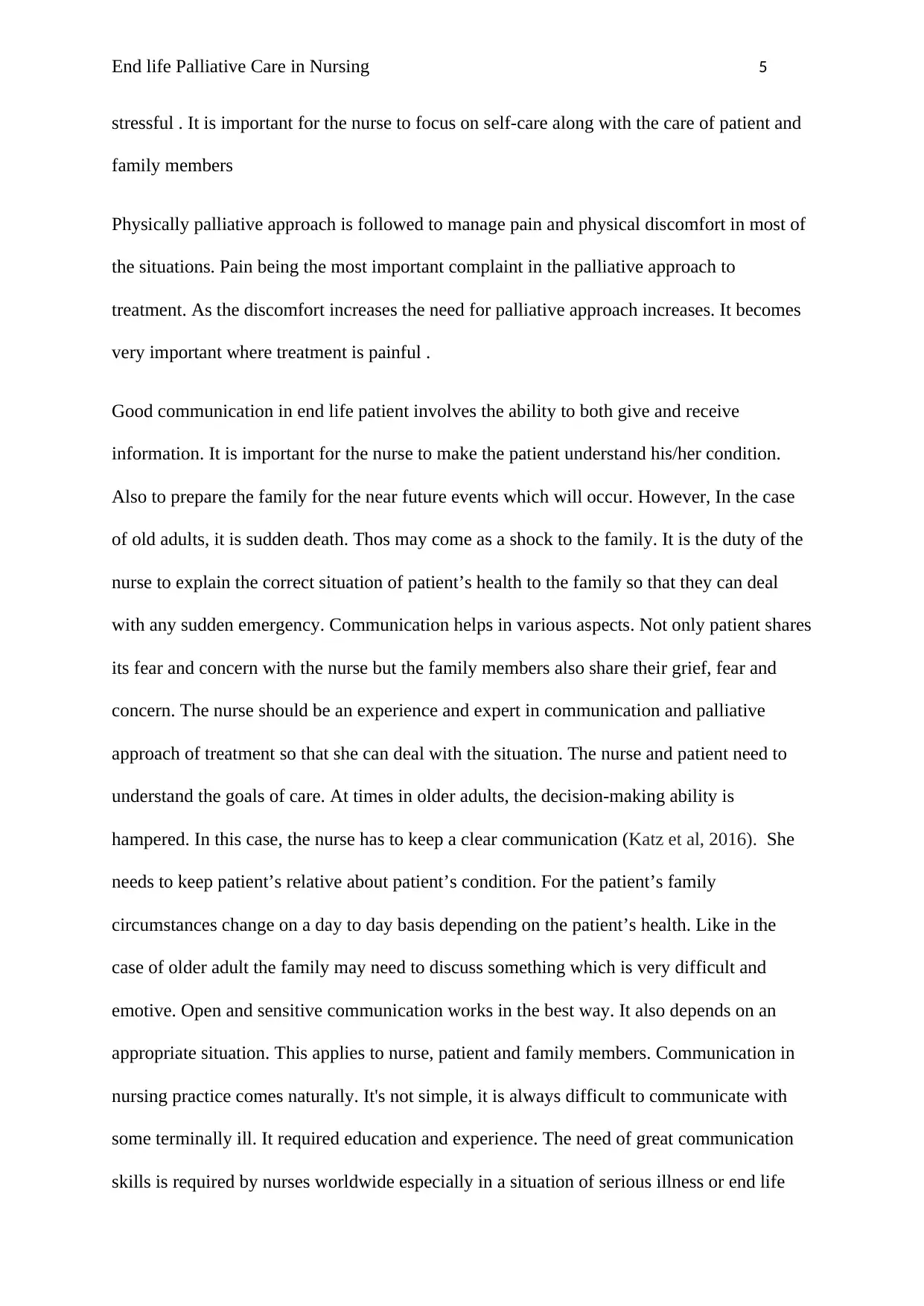
End life Palliative Care in Nursing 5
stressful . It is important for the nurse to focus on self-care along with the care of patient and
family members
Physically palliative approach is followed to manage pain and physical discomfort in most of
the situations. Pain being the most important complaint in the palliative approach to
treatment. As the discomfort increases the need for palliative approach increases. It becomes
very important where treatment is painful .
Good communication in end life patient involves the ability to both give and receive
information. It is important for the nurse to make the patient understand his/her condition.
Also to prepare the family for the near future events which will occur. However, In the case
of old adults, it is sudden death. Thos may come as a shock to the family. It is the duty of the
nurse to explain the correct situation of patient’s health to the family so that they can deal
with any sudden emergency. Communication helps in various aspects. Not only patient shares
its fear and concern with the nurse but the family members also share their grief, fear and
concern. The nurse should be an experience and expert in communication and palliative
approach of treatment so that she can deal with the situation. The nurse and patient need to
understand the goals of care. At times in older adults, the decision-making ability is
hampered. In this case, the nurse has to keep a clear communication (Katz et al, 2016). She
needs to keep patient’s relative about patient’s condition. For the patient’s family
circumstances change on a day to day basis depending on the patient’s health. Like in the
case of older adult the family may need to discuss something which is very difficult and
emotive. Open and sensitive communication works in the best way. It also depends on an
appropriate situation. This applies to nurse, patient and family members. Communication in
nursing practice comes naturally. It's not simple, it is always difficult to communicate with
some terminally ill. It required education and experience. The need of great communication
skills is required by nurses worldwide especially in a situation of serious illness or end life
stressful . It is important for the nurse to focus on self-care along with the care of patient and
family members
Physically palliative approach is followed to manage pain and physical discomfort in most of
the situations. Pain being the most important complaint in the palliative approach to
treatment. As the discomfort increases the need for palliative approach increases. It becomes
very important where treatment is painful .
Good communication in end life patient involves the ability to both give and receive
information. It is important for the nurse to make the patient understand his/her condition.
Also to prepare the family for the near future events which will occur. However, In the case
of old adults, it is sudden death. Thos may come as a shock to the family. It is the duty of the
nurse to explain the correct situation of patient’s health to the family so that they can deal
with any sudden emergency. Communication helps in various aspects. Not only patient shares
its fear and concern with the nurse but the family members also share their grief, fear and
concern. The nurse should be an experience and expert in communication and palliative
approach of treatment so that she can deal with the situation. The nurse and patient need to
understand the goals of care. At times in older adults, the decision-making ability is
hampered. In this case, the nurse has to keep a clear communication (Katz et al, 2016). She
needs to keep patient’s relative about patient’s condition. For the patient’s family
circumstances change on a day to day basis depending on the patient’s health. Like in the
case of older adult the family may need to discuss something which is very difficult and
emotive. Open and sensitive communication works in the best way. It also depends on an
appropriate situation. This applies to nurse, patient and family members. Communication in
nursing practice comes naturally. It's not simple, it is always difficult to communicate with
some terminally ill. It required education and experience. The need of great communication
skills is required by nurses worldwide especially in a situation of serious illness or end life
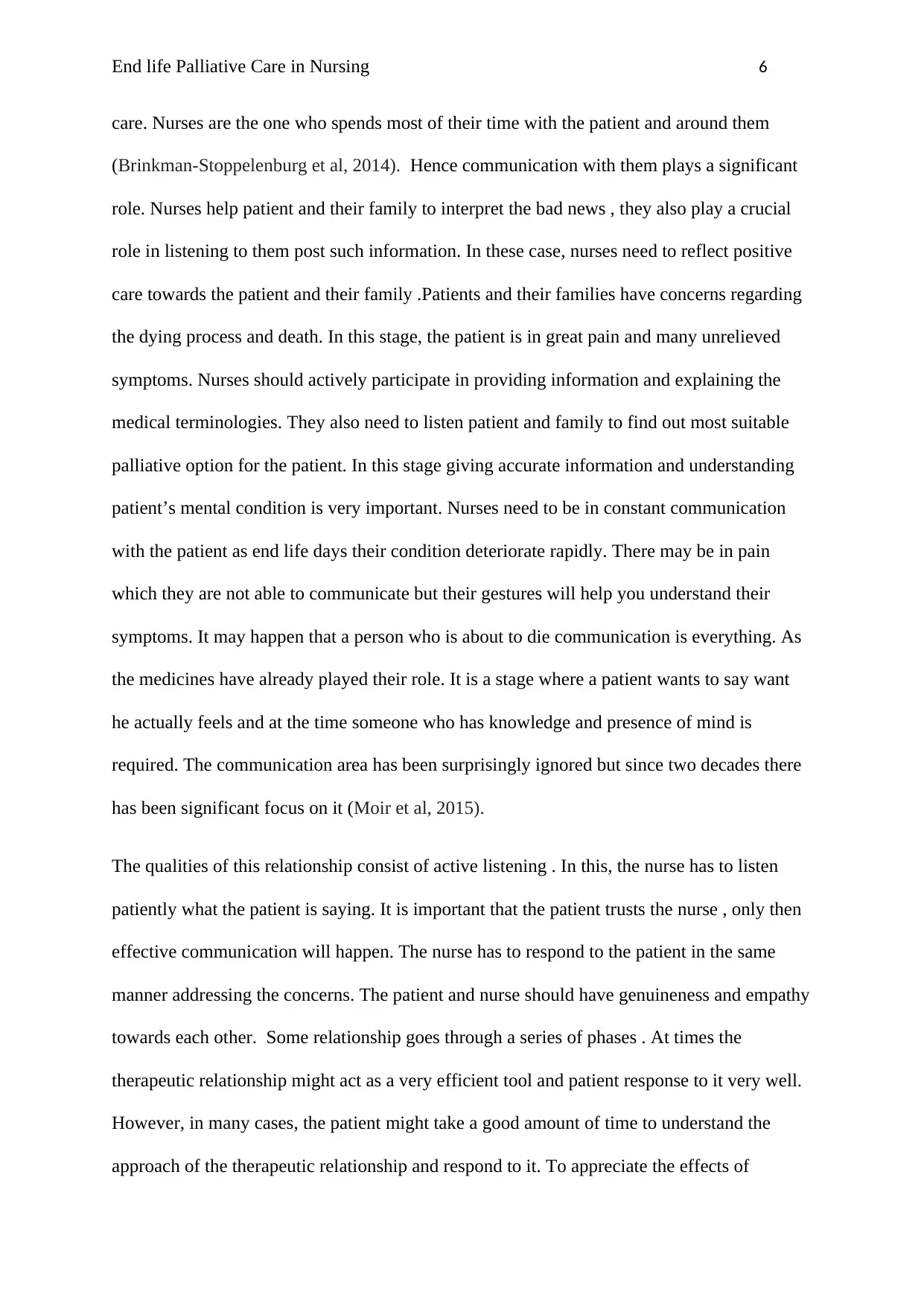
End life Palliative Care in Nursing 6
care. Nurses are the one who spends most of their time with the patient and around them
(Brinkman-Stoppelenburg et al, 2014). Hence communication with them plays a significant
role. Nurses help patient and their family to interpret the bad news , they also play a crucial
role in listening to them post such information. In these case, nurses need to reflect positive
care towards the patient and their family .Patients and their families have concerns regarding
the dying process and death. In this stage, the patient is in great pain and many unrelieved
symptoms. Nurses should actively participate in providing information and explaining the
medical terminologies. They also need to listen patient and family to find out most suitable
palliative option for the patient. In this stage giving accurate information and understanding
patient’s mental condition is very important. Nurses need to be in constant communication
with the patient as end life days their condition deteriorate rapidly. There may be in pain
which they are not able to communicate but their gestures will help you understand their
symptoms. It may happen that a person who is about to die communication is everything. As
the medicines have already played their role. It is a stage where a patient wants to say want
he actually feels and at the time someone who has knowledge and presence of mind is
required. The communication area has been surprisingly ignored but since two decades there
has been significant focus on it (Moir et al, 2015).
The qualities of this relationship consist of active listening . In this, the nurse has to listen
patiently what the patient is saying. It is important that the patient trusts the nurse , only then
effective communication will happen. The nurse has to respond to the patient in the same
manner addressing the concerns. The patient and nurse should have genuineness and empathy
towards each other. Some relationship goes through a series of phases . At times the
therapeutic relationship might act as a very efficient tool and patient response to it very well.
However, in many cases, the patient might take a good amount of time to understand the
approach of the therapeutic relationship and respond to it. To appreciate the effects of
care. Nurses are the one who spends most of their time with the patient and around them
(Brinkman-Stoppelenburg et al, 2014). Hence communication with them plays a significant
role. Nurses help patient and their family to interpret the bad news , they also play a crucial
role in listening to them post such information. In these case, nurses need to reflect positive
care towards the patient and their family .Patients and their families have concerns regarding
the dying process and death. In this stage, the patient is in great pain and many unrelieved
symptoms. Nurses should actively participate in providing information and explaining the
medical terminologies. They also need to listen patient and family to find out most suitable
palliative option for the patient. In this stage giving accurate information and understanding
patient’s mental condition is very important. Nurses need to be in constant communication
with the patient as end life days their condition deteriorate rapidly. There may be in pain
which they are not able to communicate but their gestures will help you understand their
symptoms. It may happen that a person who is about to die communication is everything. As
the medicines have already played their role. It is a stage where a patient wants to say want
he actually feels and at the time someone who has knowledge and presence of mind is
required. The communication area has been surprisingly ignored but since two decades there
has been significant focus on it (Moir et al, 2015).
The qualities of this relationship consist of active listening . In this, the nurse has to listen
patiently what the patient is saying. It is important that the patient trusts the nurse , only then
effective communication will happen. The nurse has to respond to the patient in the same
manner addressing the concerns. The patient and nurse should have genuineness and empathy
towards each other. Some relationship goes through a series of phases . At times the
therapeutic relationship might act as a very efficient tool and patient response to it very well.
However, in many cases, the patient might take a good amount of time to understand the
approach of the therapeutic relationship and respond to it. To appreciate the effects of
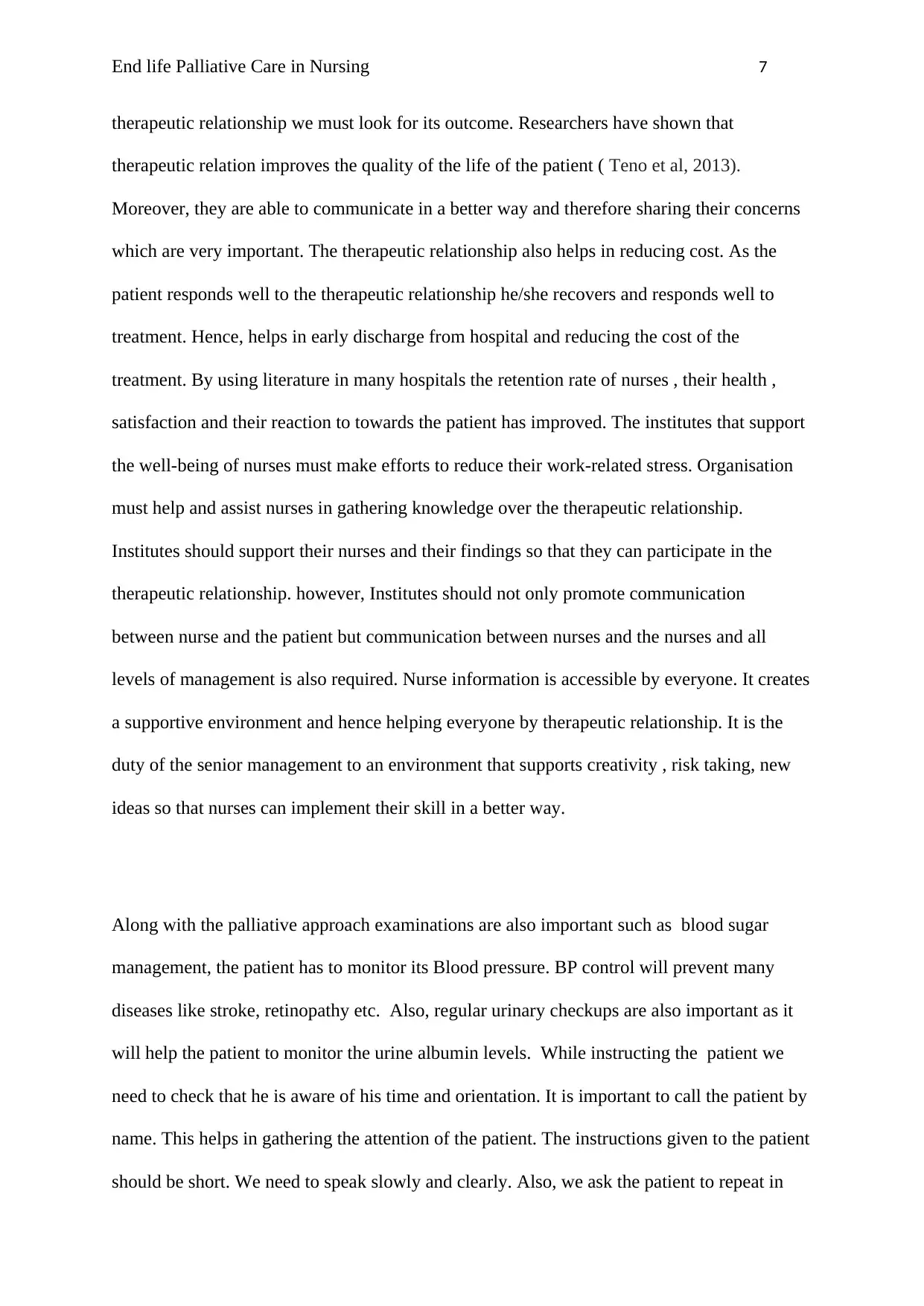
End life Palliative Care in Nursing 7
therapeutic relationship we must look for its outcome. Researchers have shown that
therapeutic relation improves the quality of the life of the patient ( Teno et al, 2013).
Moreover, they are able to communicate in a better way and therefore sharing their concerns
which are very important. The therapeutic relationship also helps in reducing cost. As the
patient responds well to the therapeutic relationship he/she recovers and responds well to
treatment. Hence, helps in early discharge from hospital and reducing the cost of the
treatment. By using literature in many hospitals the retention rate of nurses , their health ,
satisfaction and their reaction to towards the patient has improved. The institutes that support
the well-being of nurses must make efforts to reduce their work-related stress. Organisation
must help and assist nurses in gathering knowledge over the therapeutic relationship.
Institutes should support their nurses and their findings so that they can participate in the
therapeutic relationship. however, Institutes should not only promote communication
between nurse and the patient but communication between nurses and the nurses and all
levels of management is also required. Nurse information is accessible by everyone. It creates
a supportive environment and hence helping everyone by therapeutic relationship. It is the
duty of the senior management to an environment that supports creativity , risk taking, new
ideas so that nurses can implement their skill in a better way.
Along with the palliative approach examinations are also important such as blood sugar
management, the patient has to monitor its Blood pressure. BP control will prevent many
diseases like stroke, retinopathy etc. Also, regular urinary checkups are also important as it
will help the patient to monitor the urine albumin levels. While instructing the patient we
need to check that he is aware of his time and orientation. It is important to call the patient by
name. This helps in gathering the attention of the patient. The instructions given to the patient
should be short. We need to speak slowly and clearly. Also, we ask the patient to repeat in
therapeutic relationship we must look for its outcome. Researchers have shown that
therapeutic relation improves the quality of the life of the patient ( Teno et al, 2013).
Moreover, they are able to communicate in a better way and therefore sharing their concerns
which are very important. The therapeutic relationship also helps in reducing cost. As the
patient responds well to the therapeutic relationship he/she recovers and responds well to
treatment. Hence, helps in early discharge from hospital and reducing the cost of the
treatment. By using literature in many hospitals the retention rate of nurses , their health ,
satisfaction and their reaction to towards the patient has improved. The institutes that support
the well-being of nurses must make efforts to reduce their work-related stress. Organisation
must help and assist nurses in gathering knowledge over the therapeutic relationship.
Institutes should support their nurses and their findings so that they can participate in the
therapeutic relationship. however, Institutes should not only promote communication
between nurse and the patient but communication between nurses and the nurses and all
levels of management is also required. Nurse information is accessible by everyone. It creates
a supportive environment and hence helping everyone by therapeutic relationship. It is the
duty of the senior management to an environment that supports creativity , risk taking, new
ideas so that nurses can implement their skill in a better way.
Along with the palliative approach examinations are also important such as blood sugar
management, the patient has to monitor its Blood pressure. BP control will prevent many
diseases like stroke, retinopathy etc. Also, regular urinary checkups are also important as it
will help the patient to monitor the urine albumin levels. While instructing the patient we
need to check that he is aware of his time and orientation. It is important to call the patient by
name. This helps in gathering the attention of the patient. The instructions given to the patient
should be short. We need to speak slowly and clearly. Also, we ask the patient to repeat in
Paraphrase This Document
Need a fresh take? Get an instant paraphrase of this document with our AI Paraphraser
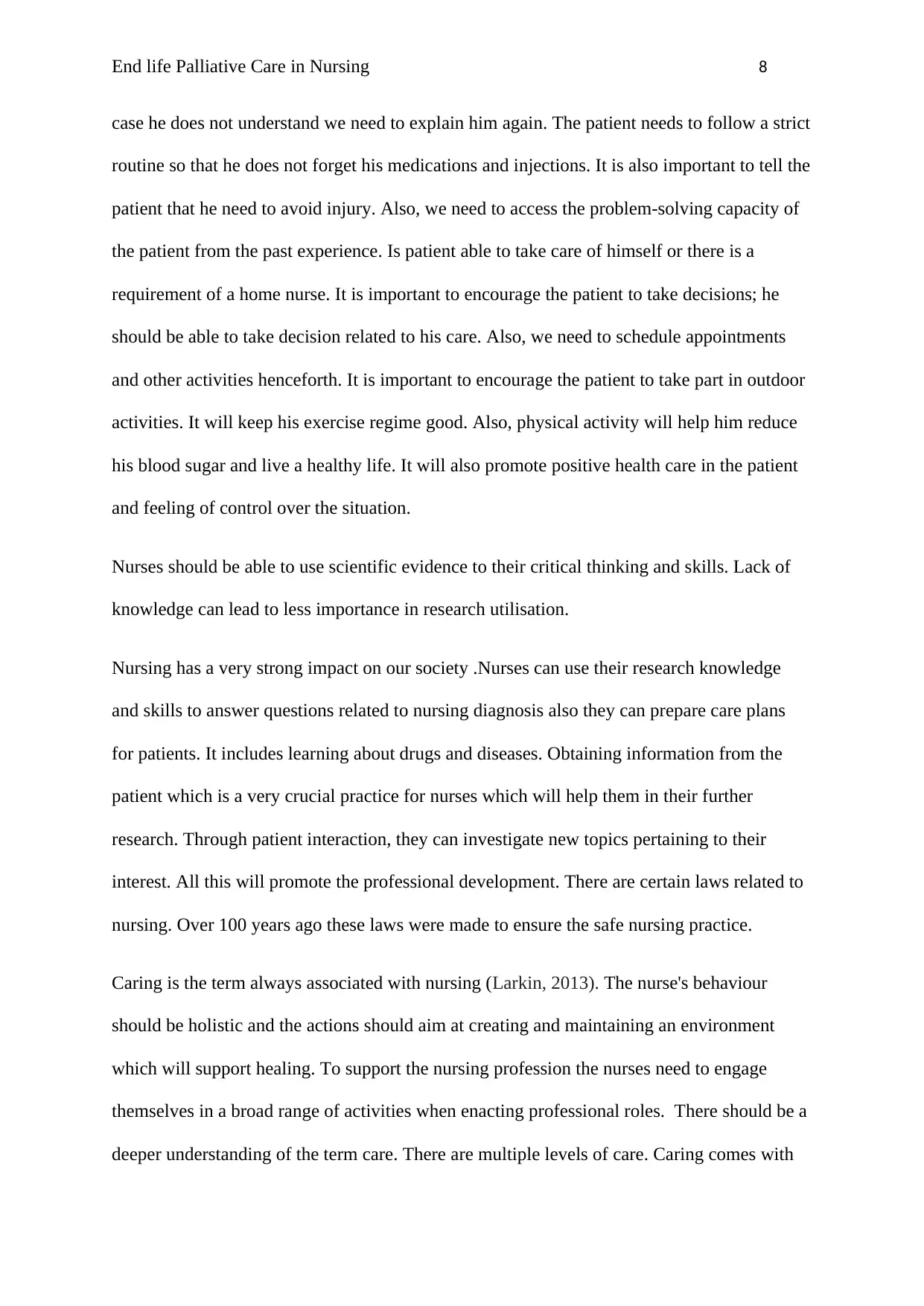
End life Palliative Care in Nursing 8
case he does not understand we need to explain him again. The patient needs to follow a strict
routine so that he does not forget his medications and injections. It is also important to tell the
patient that he need to avoid injury. Also, we need to access the problem-solving capacity of
the patient from the past experience. Is patient able to take care of himself or there is a
requirement of a home nurse. It is important to encourage the patient to take decisions; he
should be able to take decision related to his care. Also, we need to schedule appointments
and other activities henceforth. It is important to encourage the patient to take part in outdoor
activities. It will keep his exercise regime good. Also, physical activity will help him reduce
his blood sugar and live a healthy life. It will also promote positive health care in the patient
and feeling of control over the situation.
Nurses should be able to use scientific evidence to their critical thinking and skills. Lack of
knowledge can lead to less importance in research utilisation.
Nursing has a very strong impact on our society .Nurses can use their research knowledge
and skills to answer questions related to nursing diagnosis also they can prepare care plans
for patients. It includes learning about drugs and diseases. Obtaining information from the
patient which is a very crucial practice for nurses which will help them in their further
research. Through patient interaction, they can investigate new topics pertaining to their
interest. All this will promote the professional development. There are certain laws related to
nursing. Over 100 years ago these laws were made to ensure the safe nursing practice.
Caring is the term always associated with nursing (Larkin, 2013). The nurse's behaviour
should be holistic and the actions should aim at creating and maintaining an environment
which will support healing. To support the nursing profession the nurses need to engage
themselves in a broad range of activities when enacting professional roles. There should be a
deeper understanding of the term care. There are multiple levels of care. Caring comes with
case he does not understand we need to explain him again. The patient needs to follow a strict
routine so that he does not forget his medications and injections. It is also important to tell the
patient that he need to avoid injury. Also, we need to access the problem-solving capacity of
the patient from the past experience. Is patient able to take care of himself or there is a
requirement of a home nurse. It is important to encourage the patient to take decisions; he
should be able to take decision related to his care. Also, we need to schedule appointments
and other activities henceforth. It is important to encourage the patient to take part in outdoor
activities. It will keep his exercise regime good. Also, physical activity will help him reduce
his blood sugar and live a healthy life. It will also promote positive health care in the patient
and feeling of control over the situation.
Nurses should be able to use scientific evidence to their critical thinking and skills. Lack of
knowledge can lead to less importance in research utilisation.
Nursing has a very strong impact on our society .Nurses can use their research knowledge
and skills to answer questions related to nursing diagnosis also they can prepare care plans
for patients. It includes learning about drugs and diseases. Obtaining information from the
patient which is a very crucial practice for nurses which will help them in their further
research. Through patient interaction, they can investigate new topics pertaining to their
interest. All this will promote the professional development. There are certain laws related to
nursing. Over 100 years ago these laws were made to ensure the safe nursing practice.
Caring is the term always associated with nursing (Larkin, 2013). The nurse's behaviour
should be holistic and the actions should aim at creating and maintaining an environment
which will support healing. To support the nursing profession the nurses need to engage
themselves in a broad range of activities when enacting professional roles. There should be a
deeper understanding of the term care. There are multiple levels of care. Caring comes with
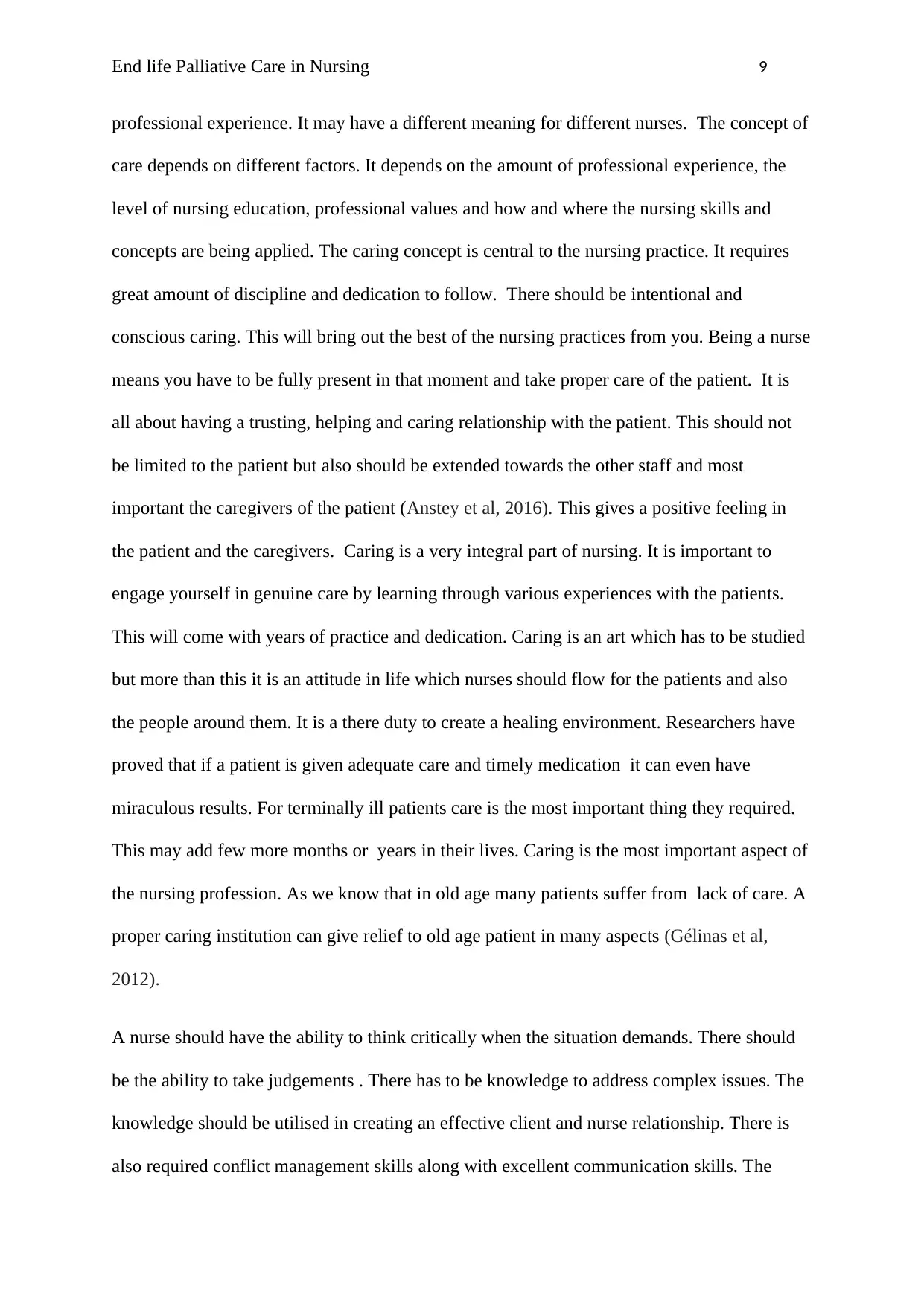
End life Palliative Care in Nursing 9
professional experience. It may have a different meaning for different nurses. The concept of
care depends on different factors. It depends on the amount of professional experience, the
level of nursing education, professional values and how and where the nursing skills and
concepts are being applied. The caring concept is central to the nursing practice. It requires
great amount of discipline and dedication to follow. There should be intentional and
conscious caring. This will bring out the best of the nursing practices from you. Being a nurse
means you have to be fully present in that moment and take proper care of the patient. It is
all about having a trusting, helping and caring relationship with the patient. This should not
be limited to the patient but also should be extended towards the other staff and most
important the caregivers of the patient (Anstey et al, 2016). This gives a positive feeling in
the patient and the caregivers. Caring is a very integral part of nursing. It is important to
engage yourself in genuine care by learning through various experiences with the patients.
This will come with years of practice and dedication. Caring is an art which has to be studied
but more than this it is an attitude in life which nurses should flow for the patients and also
the people around them. It is a there duty to create a healing environment. Researchers have
proved that if a patient is given adequate care and timely medication it can even have
miraculous results. For terminally ill patients care is the most important thing they required.
This may add few more months or years in their lives. Caring is the most important aspect of
the nursing profession. As we know that in old age many patients suffer from lack of care. A
proper caring institution can give relief to old age patient in many aspects (Gélinas et al,
2012).
A nurse should have the ability to think critically when the situation demands. There should
be the ability to take judgements . There has to be knowledge to address complex issues. The
knowledge should be utilised in creating an effective client and nurse relationship. There is
also required conflict management skills along with excellent communication skills. The
professional experience. It may have a different meaning for different nurses. The concept of
care depends on different factors. It depends on the amount of professional experience, the
level of nursing education, professional values and how and where the nursing skills and
concepts are being applied. The caring concept is central to the nursing practice. It requires
great amount of discipline and dedication to follow. There should be intentional and
conscious caring. This will bring out the best of the nursing practices from you. Being a nurse
means you have to be fully present in that moment and take proper care of the patient. It is
all about having a trusting, helping and caring relationship with the patient. This should not
be limited to the patient but also should be extended towards the other staff and most
important the caregivers of the patient (Anstey et al, 2016). This gives a positive feeling in
the patient and the caregivers. Caring is a very integral part of nursing. It is important to
engage yourself in genuine care by learning through various experiences with the patients.
This will come with years of practice and dedication. Caring is an art which has to be studied
but more than this it is an attitude in life which nurses should flow for the patients and also
the people around them. It is a there duty to create a healing environment. Researchers have
proved that if a patient is given adequate care and timely medication it can even have
miraculous results. For terminally ill patients care is the most important thing they required.
This may add few more months or years in their lives. Caring is the most important aspect of
the nursing profession. As we know that in old age many patients suffer from lack of care. A
proper caring institution can give relief to old age patient in many aspects (Gélinas et al,
2012).
A nurse should have the ability to think critically when the situation demands. There should
be the ability to take judgements . There has to be knowledge to address complex issues. The
knowledge should be utilised in creating an effective client and nurse relationship. There is
also required conflict management skills along with excellent communication skills. The

End life Palliative Care in Nursing 10
nursing practice is used to achieve best client care and health outcomes. There should be a
vision of excellence .
nursing practice is used to achieve best client care and health outcomes. There should be a
vision of excellence .
Secure Best Marks with AI Grader
Need help grading? Try our AI Grader for instant feedback on your assignments.
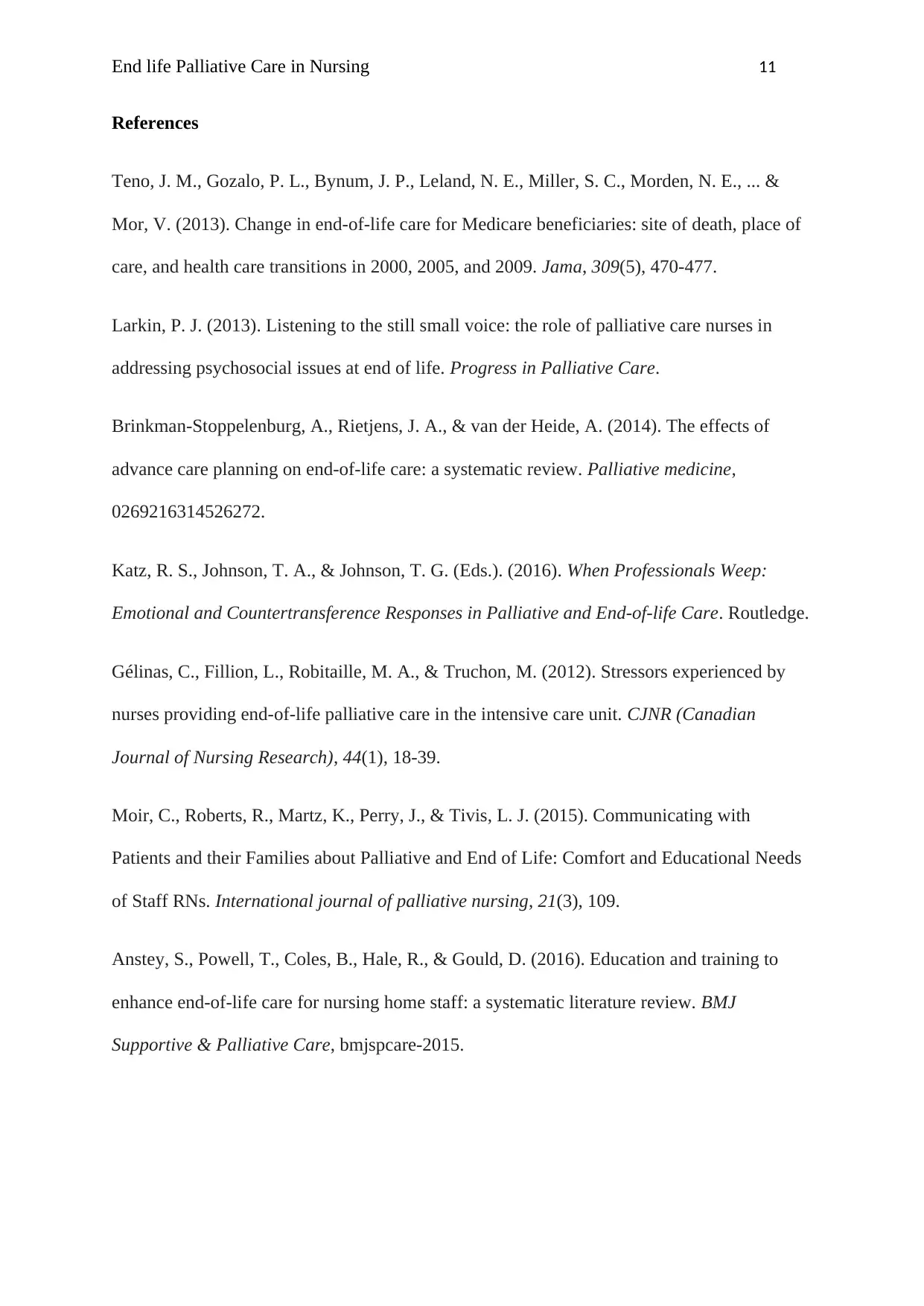
End life Palliative Care in Nursing 11
References
Teno, J. M., Gozalo, P. L., Bynum, J. P., Leland, N. E., Miller, S. C., Morden, N. E., ... &
Mor, V. (2013). Change in end-of-life care for Medicare beneficiaries: site of death, place of
care, and health care transitions in 2000, 2005, and 2009. Jama, 309(5), 470-477.
Larkin, P. J. (2013). Listening to the still small voice: the role of palliative care nurses in
addressing psychosocial issues at end of life. Progress in Palliative Care.
Brinkman-Stoppelenburg, A., Rietjens, J. A., & van der Heide, A. (2014). The effects of
advance care planning on end-of-life care: a systematic review. Palliative medicine,
0269216314526272.
Katz, R. S., Johnson, T. A., & Johnson, T. G. (Eds.). (2016). When Professionals Weep:
Emotional and Countertransference Responses in Palliative and End-of-life Care. Routledge.
Gélinas, C., Fillion, L., Robitaille, M. A., & Truchon, M. (2012). Stressors experienced by
nurses providing end-of-life palliative care in the intensive care unit. CJNR (Canadian
Journal of Nursing Research), 44(1), 18-39.
Moir, C., Roberts, R., Martz, K., Perry, J., & Tivis, L. J. (2015). Communicating with
Patients and their Families about Palliative and End of Life: Comfort and Educational Needs
of Staff RNs. International journal of palliative nursing, 21(3), 109.
Anstey, S., Powell, T., Coles, B., Hale, R., & Gould, D. (2016). Education and training to
enhance end-of-life care for nursing home staff: a systematic literature review. BMJ
Supportive & Palliative Care, bmjspcare-2015.
References
Teno, J. M., Gozalo, P. L., Bynum, J. P., Leland, N. E., Miller, S. C., Morden, N. E., ... &
Mor, V. (2013). Change in end-of-life care for Medicare beneficiaries: site of death, place of
care, and health care transitions in 2000, 2005, and 2009. Jama, 309(5), 470-477.
Larkin, P. J. (2013). Listening to the still small voice: the role of palliative care nurses in
addressing psychosocial issues at end of life. Progress in Palliative Care.
Brinkman-Stoppelenburg, A., Rietjens, J. A., & van der Heide, A. (2014). The effects of
advance care planning on end-of-life care: a systematic review. Palliative medicine,
0269216314526272.
Katz, R. S., Johnson, T. A., & Johnson, T. G. (Eds.). (2016). When Professionals Weep:
Emotional and Countertransference Responses in Palliative and End-of-life Care. Routledge.
Gélinas, C., Fillion, L., Robitaille, M. A., & Truchon, M. (2012). Stressors experienced by
nurses providing end-of-life palliative care in the intensive care unit. CJNR (Canadian
Journal of Nursing Research), 44(1), 18-39.
Moir, C., Roberts, R., Martz, K., Perry, J., & Tivis, L. J. (2015). Communicating with
Patients and their Families about Palliative and End of Life: Comfort and Educational Needs
of Staff RNs. International journal of palliative nursing, 21(3), 109.
Anstey, S., Powell, T., Coles, B., Hale, R., & Gould, D. (2016). Education and training to
enhance end-of-life care for nursing home staff: a systematic literature review. BMJ
Supportive & Palliative Care, bmjspcare-2015.
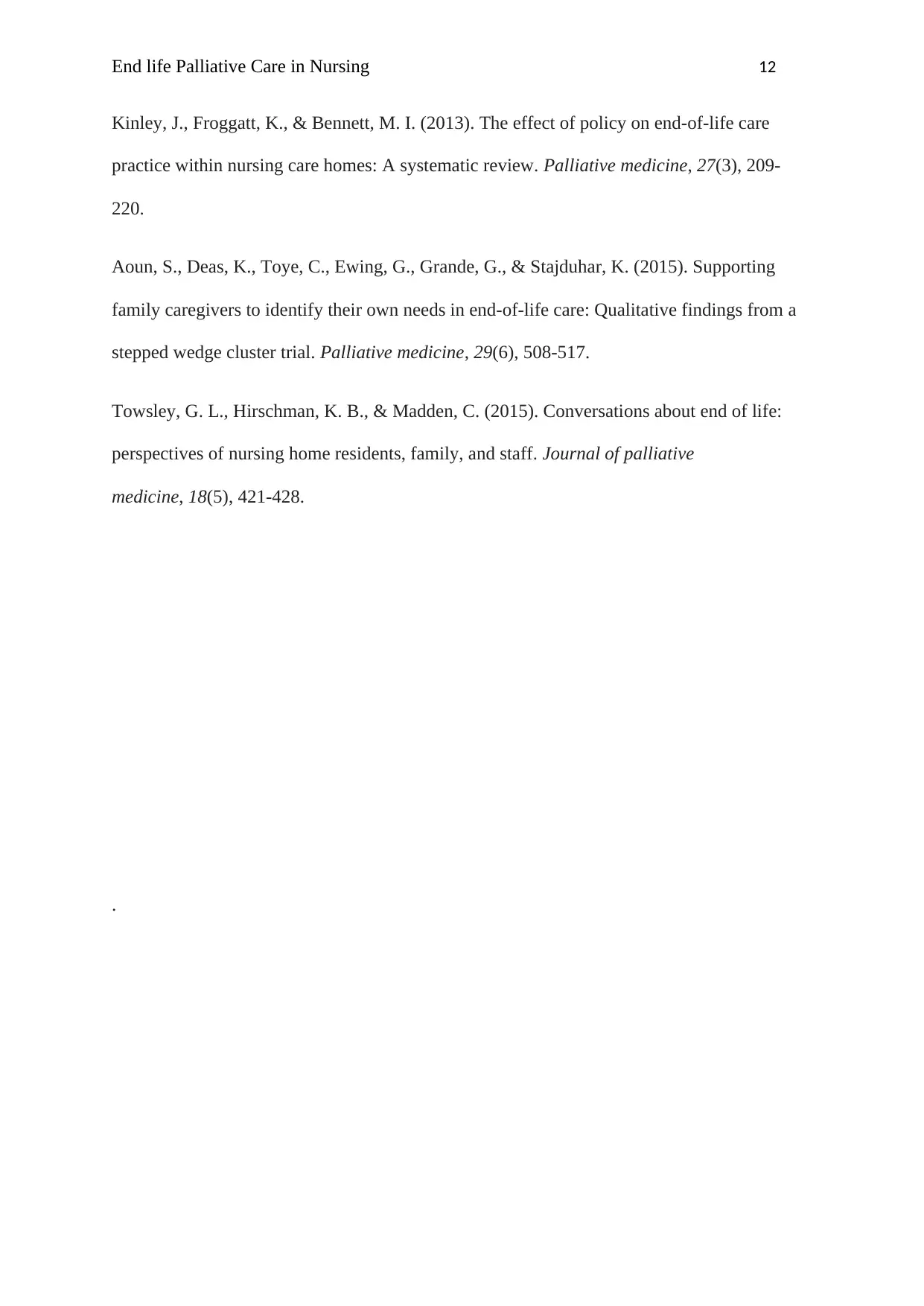
End life Palliative Care in Nursing 12
Kinley, J., Froggatt, K., & Bennett, M. I. (2013). The effect of policy on end-of-life care
practice within nursing care homes: A systematic review. Palliative medicine, 27(3), 209-
220.
Aoun, S., Deas, K., Toye, C., Ewing, G., Grande, G., & Stajduhar, K. (2015). Supporting
family caregivers to identify their own needs in end-of-life care: Qualitative findings from a
stepped wedge cluster trial. Palliative medicine, 29(6), 508-517.
Towsley, G. L., Hirschman, K. B., & Madden, C. (2015). Conversations about end of life:
perspectives of nursing home residents, family, and staff. Journal of palliative
medicine, 18(5), 421-428.
.
Kinley, J., Froggatt, K., & Bennett, M. I. (2013). The effect of policy on end-of-life care
practice within nursing care homes: A systematic review. Palliative medicine, 27(3), 209-
220.
Aoun, S., Deas, K., Toye, C., Ewing, G., Grande, G., & Stajduhar, K. (2015). Supporting
family caregivers to identify their own needs in end-of-life care: Qualitative findings from a
stepped wedge cluster trial. Palliative medicine, 29(6), 508-517.
Towsley, G. L., Hirschman, K. B., & Madden, C. (2015). Conversations about end of life:
perspectives of nursing home residents, family, and staff. Journal of palliative
medicine, 18(5), 421-428.
.
1 out of 12
Related Documents
Your All-in-One AI-Powered Toolkit for Academic Success.
+13062052269
info@desklib.com
Available 24*7 on WhatsApp / Email
![[object Object]](/_next/static/media/star-bottom.7253800d.svg)
Unlock your academic potential
© 2024 | Zucol Services PVT LTD | All rights reserved.





